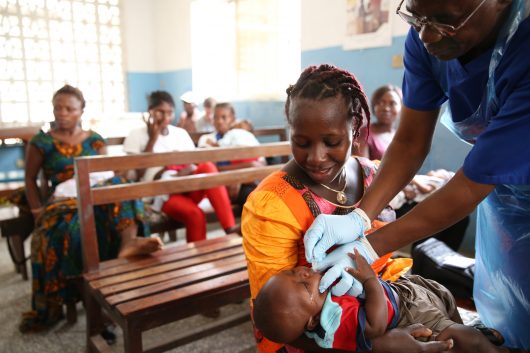New Ebola Vaccine Gives Hope

In 2014, West Africa saw the largest Ebola outbreak in history; more than 11,000 people died, and the disease infected more than 27,000 people. Ebola has a very high mortality rate; it kills up to 70 percent of its victims. An immense amount of fear surrounds this disease. In 2014, four cases of Ebola were reported in the United States, including two who contracted the disease on U.S. soil. The rampant global spread of the disease caught the medical community off guard, but it was not the first time they had searched for a solution.
Unfortunately, the Ebola vaccine research from 1974-2014 did not yield promising results, and the treatments for the disease were difficult and labor-intensive. Medical teams would enter an infected area, would separate the sick from those that had not been infected and they would burn the bodies of those that perished from the disease. The protective gear to prevent the medical staff from infection is difficult to wield and can be risky. The need for a vaccine was critical.
As the disease ravaged West Africa in 2014, researchers began working on a vaccine. Clinical trials for two vaccines began in 2014, but there were ethical concerns. The trials had to be expedited because of the aggressive nature of the disease and how many people were infected. The funding for Ebola treatments remained flat from 2004, and the challenges were immense.
In July 2015, the World Health Organization (WHO) released a statement saying that a vaccine developed and tested by Merck, Sharp & Dohme “is highly effective against Ebola.” The rapid work created a turning point in the fight against Ebola.
The Ebola vaccine uses an interesting methodology to stop the spread of the virus because the virus is so virulent, and it spreads so quickly. The vaccine is designed with a “ring” method meaning that every person that has come into contact with an Ebola patient is vaccinated. This stops the virus from spreading further.
The promise of the vaccine was validated in December 2016, as The Lancet reported final results from a Guinea trial that showed that the new Ebola vaccine shows 100 percent effectiveness. While it was not able to stop the last outbreak, an emergency stockpile of 300,000 doses has been developed in hopes of stopping the next outbreak. Merck must now apply to the WHO for full approval, and the U.S. Food and Drug Administration (FDA) will likely be tapped for licensing.
The vaccine may not be effective against all strains of Ebola, but it shows great promise to prevent a catastrophic outbreak like the one in 2014, and it gives hope to the nations that have been devastated by the disease.
– Jennifer Graham
Photo: Flickr
